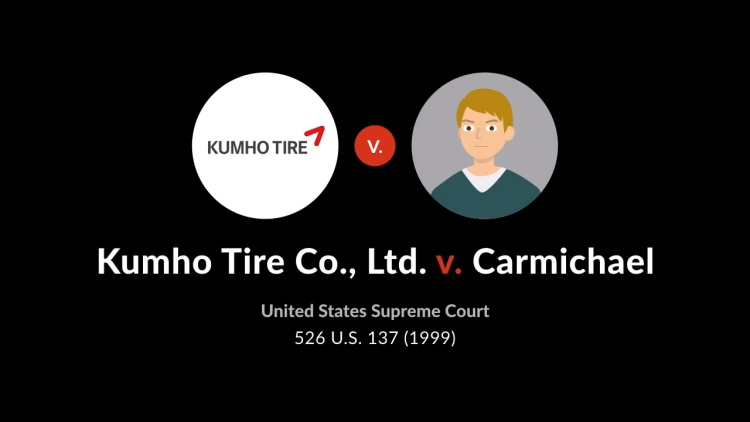Kumho Tire Company, Ltd. v. Carmichael
United States Supreme Court
526 U.S. 137 (1999)

- Written by Sean Carroll, JD
Facts
Patrick Carmichael (plaintiff) was driving a minivan when one of its tires blew out. The tire was manufactured by Kumho Tire Company (Kumho) (defendant). The blowout caused the death of one passenger and injury to the others. Carmichael brought a products-liability action against Kumho, claiming the tire was defective. At trial, Carmichael sought to introduce the testimony of his engineering expert witness, Dennis Carlson, who stated that he had concluded that the blowout was caused by a manufacturing or design defect in the tire. Carlson testified that he could tell the difference between blowouts caused by defects and those caused by tire abuse. He stated that blowouts caused by tire abuse exhibited four symptoms and that at least two of those symptoms had to be present for a blowout based on tire abuse to occur. Finally, Carlson testified that he saw all four symptoms of abuse in his inspection of the tire in question but that none of the symptoms were present to a significant degree. He concluded that tire abuse did not cause the blowout and so it must have been caused by a defect. Kumho sought to exclude the testimony based on the preliminary reliability test from Daubert v. Merrell Dow Pharmaceuticals, Inc. (1993). The district court agreed and excluded the testimony based on a preliminary determination that Carlson’s methodology in his determination of what caused the blowout was unreliable. The United States Court of Appeals for the Eleventh Circuit reversed. The United States Supreme Court granted certiorari.
Rule of Law
Issue
Holding and Reasoning (Breyer, J.)
Concurrence (Scalia, J.)
Concurrence/Dissent (Stevens, J.)
What to do next…
Here's why 907,000 law students have relied on our case briefs:
- Written by law professors and practitioners, not other law students. 47,100 briefs, keyed to 996 casebooks. Top-notch customer support.
- The right amount of information, includes the facts, issues, rule of law, holding and reasoning, and any concurrences and dissents.
- Access in your classes, works on your mobile and tablet. Massive library of related video lessons and high quality multiple-choice questions.
- Easy to use, uniform format for every case brief. Written in plain English, not in legalese. Our briefs summarize and simplify; they don’t just repeat the court’s language.





